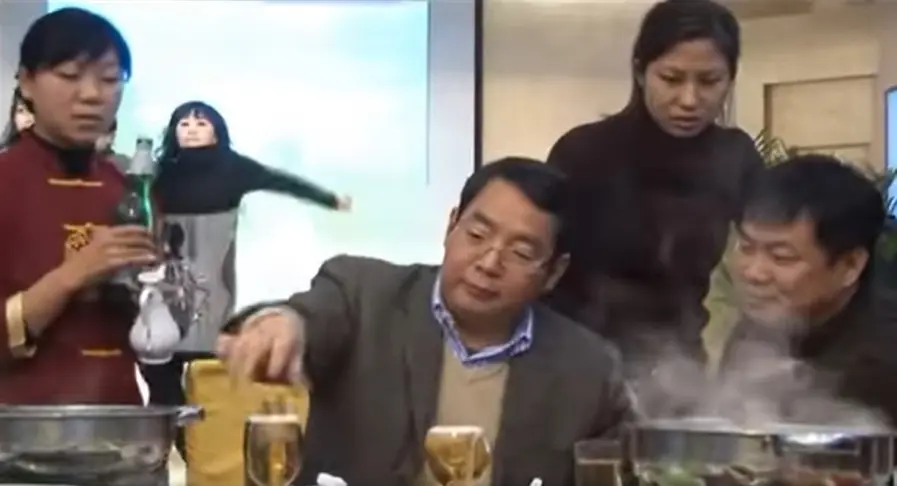A Chinese county level official in his prime. The Mainland Chinese documentary “书记” introduces Guo Yongchang, secretary of the Gushi County Party Committee, who “rules” over 1.6 million people in Southern Henan. The film covers the three months before secretary Guo leaves his post and ends up in prison.
- Year: 2010
- Duration: 108 minutes
- Subtitles: Chinese + English
- Difficulty: Intermediate / upper intermediate
- Location: Gushi County, Henan
Story line
“书记” depicts the life of county party secretary Guo Yongchang in the office, at dinner parties, and KTV at zero distance. He is faced with two problems while serving his final term as county party secretary in Gushi:
- Attracting investment and facilitating the local economy. This involves giving them special offers (reduced prices for electricity, building etc.), excessive late-night drinking and rubbing birthday cake into the face of business relations.
- Dissolving various social contradictions that come with modernization and development. Guo has to find solutions to “complainers” who’ve somehow become the victims of government policies.

Director Zhou Hao and the genius of this film
Zhou Hao (周浩) has a long and impressive track-record as a filmmaker. Most well-known internationally is probably his documentary “Datong“, which tells the story of Geng Yanbo, the mayor of Datong. “书记” is an earlier film, yet shows strong similarities. Both films seek to understand the ecology of Chinese officialdom.
这部纪录片很真实,真实到什么程度,我感觉就差拉屎没拍了。(This documentary is very real, to the extent that it is so real, I feel like only him taking a shit is not filmed.)
Chinese viewer on zhuanlan.zhihu.com
The genius of this film: the viewer gets a sense that he’s invisibly present in the room while the protagonist goes about his daily business, talking to investors, making phone calls, passing on instructions and, most importantly, heavy drinking. But how is that possible? How can a powerful leader in rural China simply give full access and transparency?
Zhou Hao chooses let the images speak for themselves. No narrator interprets the story for us. No background music accentuates the scenes. You’re sort of left in the dark, never quite sure what to make of Guo Yongchang and his dealings. Is he a good cadre or a bad one? Which indicators apply to that question? Can you judge a politician acting in a system that you don’t comprehend? The fact that in May 2010, Guo Yongchang was sentenced to seven years in prison for the crime of accepting bribes, seems to confirm that in “书记” nothing is quite what it seems. That’s the genius of the film. It makes you question everything.
Difficulty
Watching and understanding “书记” without subtitles is tough. Firstly, it’s mostly Henan dialect which is still a northern variant similar to Beijing Chinese, but takes some getting used to. Secondly, the officials have a rather sloppy way of expressing themselves, repeating words and speaking in half sentences. Thirdly, the necessary context to understand what is being said is often missing which means you have to fill in many gaps that you’re not able to fill as an outsider. Finally, a basic understanding of Chinese politics and political titles is helpful. Those are the difficulties. In terms of vocabulary “书记” could be categorized as HSK 4 or 5.
Watch 书记 – The Transition Period (2010)
Important vocabulary
| 县委书记 | xiànwěi shūjì | county Party Secretary |
| 离任 | lí rèn | resign |
| 总负责人 | zǒng fùzé rén | chief |
| 向他汇报 | xiàng tā huìbào | report to him |
| 级别 | jíbié | rank |
| 三三大厦 | Sānsān dàshà | The name of the 33 floor building project that Guo wants to realize |
| 官场上的真实生态 | guānchǎng shàng de zhēnshí shēngtài | The real ecology in the officialdom (that the director is interested in) |
| 昨天我喝醉了,我说的能算吗 | zuótiān wǒ hē zuìle, wǒ shuō de néng suàn ma | I was drunk yesterday, does what I said count? |
| 双规 | shuāngguī | an extralegal system within the CCP for detaining and interrogating cadres who fall from grace. It can function as a verb too with 被. |
Affiliate links








Disclosure: These are affiliate links. They help me to support this blog, meaning, at no additional cost to you, I will earn a small commission if you click through and make a purchase.




